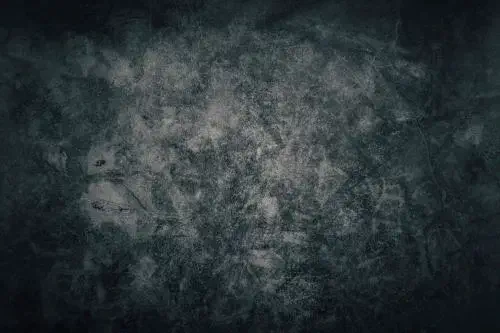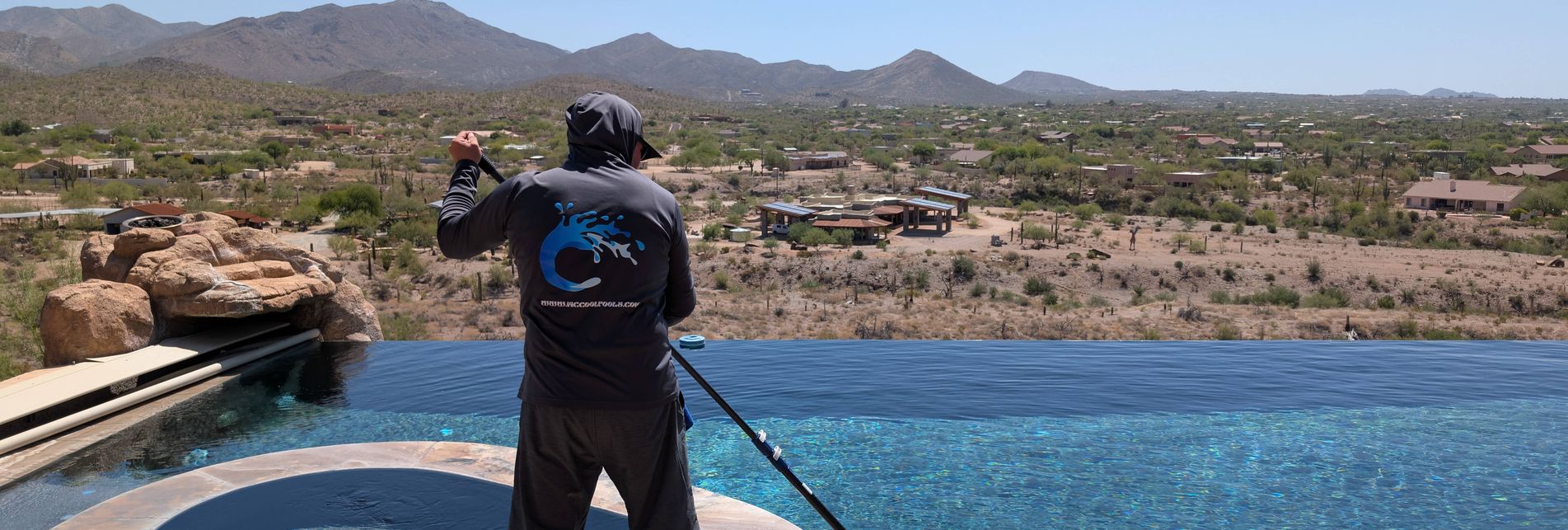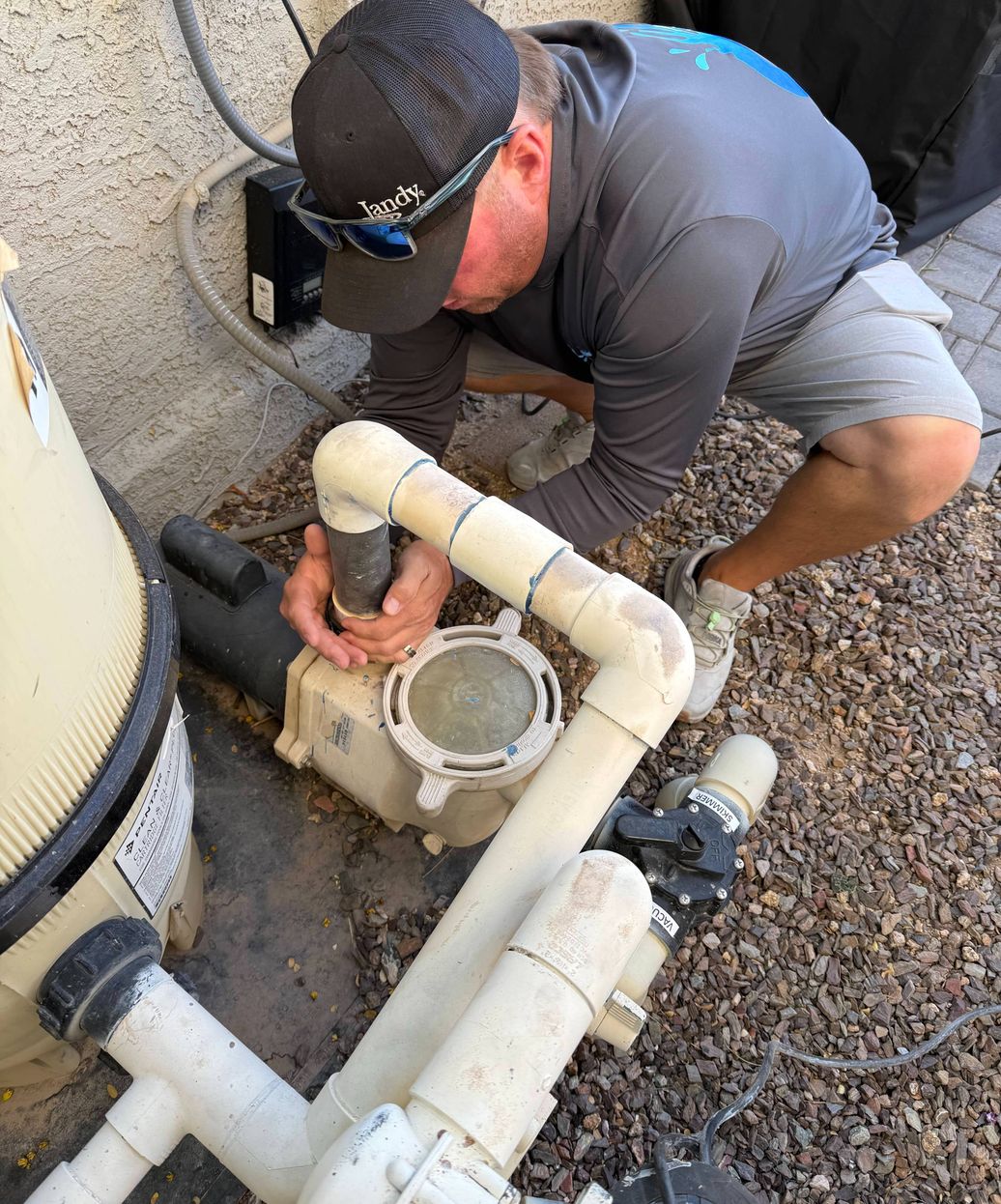Professional Pool Leak Detection & Repair Services
Stop Wasting Water and Money on Hidden Pool Leaks
At McCool's Pools, we understand the frustration and expense of pool leaks. A pool that constantly needs refilling isn't just annoying—it wastes thousands of gallons of water annually, increases chemical costs, raises utility bills, and can cause serious structural damage to your property. With nearly two decades of experience detecting and repairing pool leaks throughout the Phoenix area, our trained technicians use advanced detection technology to pinpoint even the most elusive leaks without unnecessary demolition or guesswork. Whether your leak is in underground plumbing, the pool shell, skimmers, or drains, we have the expertise and equipment to find it, explain your repair options, and restore your pool to watertight condition.
Signs Your Pool May Have a Leak
Excessive Water Loss
All pools lose some water to evaporation, especially in Phoenix's hot, dry climate. However, if you're adding more than an inch of water per week, or if water loss accelerates noticeably, you likely have a leak. The bucket test provides a simple way to distinguish evaporation from leakage—fill a bucket with pool water, mark both the bucket water level and pool water level, and compare loss after 24 hours. If the pool loses significantly more water than the bucket, you have a leak that needs professional detection.
Constantly Running Autofill
If you have an automatic water leveler that seems to run constantly or much more frequently than it used to, this strongly suggests a leak. Even small leaks can cause autofill systems to cycle repeatedly, wasting water continuously. Many homeowners don't realize they have a leak until they notice their autofill running at unusual times or examine their water bills and discover dramatic increases in consumption.
Wet Spots or Soft Ground Near Pool
Leaks in underground plumbing often manifest as persistently wet areas in your yard, particularly near the pool equipment or along plumbing runs. The ground may feel soft or spongy, grass may grow unusually lush in one area, or you might notice settling or cracking in surrounding hardscape. These symptoms indicate water escaping from underground pipes and saturating the soil, causing both water waste and potential structural damage.
Air Bubbles in Return Lines
If you see a steady stream of air bubbles coming from your return jets, this often indicates a suction-side leak allowing air into the system. Common culprits include leaking pump basket lids, valve seals, or underground suction line cracks. While some air entrainment is normal immediately after backwashing, continuous bubbles suggest a leak that compromises pump efficiency and can cause equipment damage if not addressed.
Cracks in Pool Deck or Shifting Concrete
Leaking pools can saturate soil beneath decking, causing settlement, cracking, and shifting. If you notice new cracks developing in your pool deck, particularly radiating from the pool or running parallel to its edge, underground leakage may be eroding soil support. Addressing these leaks promptly prevents more extensive and expensive structural repairs.
Unusual Chemical Consumption
Leaks dilute your pool chemistry as fresh water constantly enters. If you're suddenly using significantly more chlorine, acid, or other chemicals to maintain proper balance, or if you can't seem to keep chemistry stable despite proper testing and treatment, a leak may be constantly introducing fresh water that requires re-balancing.
Schedule Leak Detection
Our Advanced Leak Detection Methods
Pressure Testing
For suspected plumbing leaks, we isolate individual line sections and pressurize them with air or water while monitoring for pressure loss. This technique definitively confirms whether leaks exist in specific plumbing runs—skimmer lines, return lines, main drains, or cleaner lines. Once we've identified which line is leaking, we can focus our detection efforts on that specific section rather than excavating blindly.
Electronic Listening Equipment
Our sensitive acoustic detection equipment amplifies the sound of water escaping from pressurized lines. By systematically moving the sensor along the suspected leak path, we can often pinpoint leak locations to within a few feet. This technology is particularly effective for pressurized return lines where water is actively being pushed through cracks or breaks.
Dye Testing
For structural leaks in the pool shell, skimmers, lights, or fittings, we use specialized dye that's drawn toward leak points by water flow. This simple but effective technique allows us to visually confirm leak locations in areas we can see and access. It's particularly useful for finding leaks around skimmers, main drains, lights, and returns.
Visual Inspection and Experience
Sometimes the most valuable detection tool is an experienced eye. Our technicians know where leaks commonly develop in pools—skimmer throats, light niches, step corners, plumbing penetrations, and tile line areas affected by freeze damage. We examine these vulnerable spots carefully, often identifying problems through visual inspection alone before deploying technology.
Soil Probing and Excavation
When electronic detection indicates a general area but not a precise location, we use soil probes to feel for voids created by leaking water. Strategic excavation in the indicated area then exposes the actual leak point for repair. Our experience minimizes unnecessary digging, reducing landscape damage and restoration costs.
Common Leak Locations We Find and Repair
Skimmer Leaks
Skimmers are one of the most common leak sources in pools. The throat area where the skimmer body meets the pool shell is particularly vulnerable, often cracking due to soil settlement, freeze damage, or poor original installation. Plumbing connections behind the skimmer also fail, particularly if they've shifted over time. We repair minor skimmer cracks with specialized sealants, but more severe damage may require skimmer replacement to ensure a permanent fix.
Underground Plumbing Leaks
Pipes buried beneath your deck can crack or separate due to ground movement, freeze damage, or simple age-related deterioration. These leaks are particularly problematic because they waste water continuously while potentially causing soil erosion and deck settlement. Once we've located underground leaks, we excavate minimally to access the damaged section, make repairs using approved methods and materials, and restore landscaping.
Main Drain Leaks
Leaks at or around main drains are serious because they're at the deepest point of your pool and can be challenging to repair. Drain cover gaskets deteriorate and allow leakage. Plumbing connections can fail. The hydrostatic relief valve (if present) may leak. We use specialized techniques to repair or replace main drain components, sometimes requiring pool draining but ensuring permanent solutions.
Return Line and Fitting Leaks
Return fittings where water flows back into your pool can develop leaks around the fitting itself or in the plumbing behind the fitting. Freeze damage, poor installation, or fitting deterioration causes these leaks. Many can be repaired by resealing or replacing the fitting assembly without major excavation.
Light Niche Leaks
Pool lights penetrate the pool shell, creating potential leak points. The conduit connection, the niche itself, or the seal around the light lens can all leak. These leaks often worsen over time and can allow water into electrical conduits, creating safety concerns. We repair light leaks using appropriate underwater sealants or, when necessary, niche replacement.
Shell Cracks and Structural Leaks
The pool shell itself can develop cracks from settlement, freeze damage, or structural stress. These range from minor hairline cracks that are easily sealed to major structural cracks requiring more extensive repair. We assess crack severity and recommend appropriate repair methods—from simple crack injection to more involved structural reinforcement when necessary.
The Real Cost of Ignoring Pool Leaks
Water Waste and Expense
Even a small leak losing one-eighth inch per day wastes about 30 gallons daily, or roughly 900 gallons monthly. In Phoenix, this translates to significant water bills. Larger leaks can waste thousands of gallons weekly, making your pool one of your home's most expensive features. The sooner you address leaks, the more money you save on water costs.
Chemical Costs
Every gallon of water that leaks from your pool takes dissolved chemicals with it. You're not just buying water to refill—you're constantly re-treating fresh water that enters. This significantly increases chemical consumption and costs. Proper chemical balance becomes nearly impossible with significant leaks, leading to water quality problems alongside the financial waste.
Equipment Damage
Leaks that allow air into the circulation system force pumps to work harder, run hotter, and wear out faster. Pumps repeatedly losing prime can overheat and fail. Heaters cycling inefficiently waste energy. The equipment strain from operating with leaks shortens service life and leads to expensive premature replacements.
Structural Damage
Underground leaks saturate soil, causing erosion, settlement, and structural damage. Pool decks crack and shift. Plumbing systems can collapse. Nearby structures may be affected by water intrusion. What begins as a simple plumbing leak can evolve into a structural nightmare requiring extensive and expensive repairs if ignored too long.
Property Damage
Persistent leaks can damage landscaping, irrigation systems, and hardscape. Water infiltrating foundations or crawl spaces creates moisture problems inside your home. The longer leaks persist, the more extensive the collateral damage becomes. Early leak detection and repair prevents these secondary problems.
Why Choose McCool's for Leak Detection
Advanced Detection Technology
We invest in professional-grade leak detection equipment that allows us to pinpoint leak locations accurately without unnecessary demolition. Our electronic listening devices, pressure testing equipment, and other specialized tools mean we find leaks efficiently and repair them precisely, minimizing disruption to your property.
Nearly Two Decades of Experience
Since 2005, we've detected and repaired thousands of pool leaks throughout the Phoenix area. This experience means we know where to look, what questions to ask, and how to interpret subtle signs that less experienced technicians might miss. We've seen every type of leak scenario and know the most effective repair approaches for each situation.
Comprehensive Repair Capabilities
Finding leaks is only half the solution—proper repairs require expertise and the right materials. As a full-service pool company with licensed repair technicians, we can fix what we find. We don't just identify your problem and leave you to find someone else to repair it. We handle the entire process from detection through completed repair and testing.
Honest Assessment and Fair Pricing
We provide straightforward explanations of what we find, why it's leaking, and what repair options make sense for your situation. Our quotes are comprehensive and transparent. We don't inflate leak detection fees or push unnecessary repairs. You get honest professional advice and fair pricing throughout the process.
Minimally Invasive Approach
Our goal is always to minimize disruption to your property. We use detection technology to avoid unnecessary excavation. When digging is required, we do so strategically and minimally. We protect your landscaping, work cleanly, and restore affected areas properly. Many customers are surprised at how little disruption professional leak detection actually involves.
Stop Water Loss and Damage with Professional Leak Detection
Don't let pool leaks continue wasting water, money, and potentially damaging your property. McCool's Pools provides thorough, professional leak detection services backed by nearly two decades of experience and advanced detection technology. We find leaks accurately, explain your options clearly, and complete repairs properly. Our systematic approach has solved thousands of leak problems throughout the Phoenix area, saving customers from ongoing water waste and preventing expensive structural damage. If you suspect your pool is leaking, contact us today for professional leak detection service that locates problems precisely and provides lasting solutions.
Get Started Today








